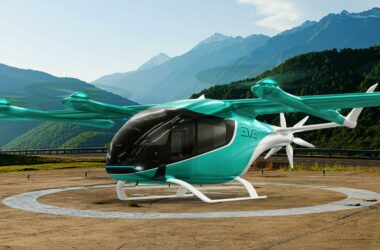Eve Air Mobility, Embraer’s urban air mobility subsidiary, announced a new financing of R$200 million (US$35 million) that will be provided by BNDES, Brazil’s development bank.
According to the company, this is the second phase of the R$490 million (just over US$88 million) financing obtained in 2022. In addition, Eve recently secured a US$50 million investment from Citibank, which will also be used in the development of the Eve-100 eVTOL.
The startup will use the funds to produce the next prototypes of the electric aircraft and the first series units.
Follow Air Data News: WhatsApp | Google News | Instagram | LinkedIn | Twitter | Facebook

“The continued support from BNDES is highly significant as we advance our eVTOL program and transition from prototype development to certification and production readiness. This funding strengthens our financial position even further and provides the resources necessary to achieve our key milestones, including certification and the commercialization of our eVTOL,” said Johann Bordais, CEO of Eve.
First flight in 2025, entry into service in 2027
Eve has undertaken a more careful development of its “flying taxi” project, focusing first on preparing the infrastructure for production and operation rather than building a manned prototype, as many rivals do.
The company is working in partnership with Brazil’s National Civil Aviation Agency (ANAC) to define the airworthiness criteria for the eVTOL.
This more consistent project is reflected in the high number of purchase intentions, which reaches almost 3,000 electric aircraft.

The first flight of the unmanned Eve-100 prototype is expected to take place in early 2025 and entry into service is scheduled for 2027.
The first markets to fly the eVTOL will be the United States and Brazil.






